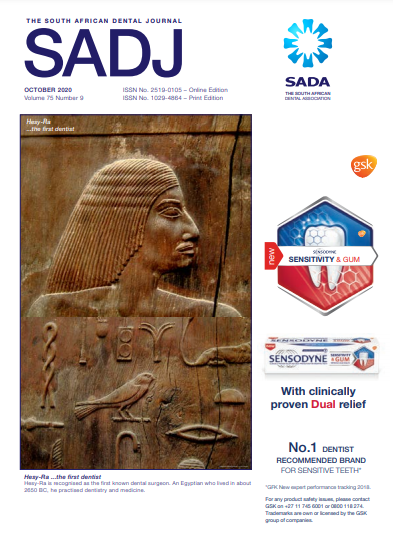Dentistry and COVID-19 - Is there a moral duty of care?
DOI:
https://doi.org/10.17159/2519-0105/2020/v75no9a7Keywords:
care, moral duty, COVID-19Abstract
The world is witnessing the spread of severe acute respiratory syndrome coronavirus 2 (SARS-CoV-2), with countless serious and fatal cases of corona virus disease (COVID-19). The impact of this pandemic has been most devastating among the health professionals due to the nature of their work. The risk of COVID-19 is particularly greater among oral health professionals due to their proximity to the oral cavity and production of aerosols. This scenario then raises the question, is there a moral duty for dental professionals to care for patients when doing so exposes them to significant risks of COVID-19.
Downloads
References
Holmboe E, Bernabeo E. The "special obligation" of the modern Hippocratic Oath for the 21st century medicine. Med Edu. 2014; 48(1): 87-942.
Davey LM. The oath of Hippocrates: an historical review. Neurosurg. 2001; 49: 554-663.
Sulmasy D. What is an oath and why should physician swear one? Theor Med Bioeth. 1999; 20: 329-46.
Steihm ER. Adverse effects of human immunoglobulin therapy. Transfus Med Rev. 2013; 27: 171-8.
Legnani P, et al. Atmospheric contamination during dental procedures. Quint Int. 1994; 25: 435-9.
Checchi V et al. COVID 19 dentistry related aspects: a literature review. International Dental Journal. 2020. https://doi.org/10.1111/idj.12601.
Ather A, et al. Coronavirus disease 19 (COVID-19): implications for dental care. Journal of Endodontics. 2020; 46(9): 1341-2.
Ge Z, et al. Possible aerosol transmission of COVID-19 and special precautions in dentistry. Journal of Zhejiang University - SCIENCE B. 2020; 1-8. doi.org/10.1631/jzus.B2010010.
Xiao A, et al. Dynamic profile of RT-PCR findings from 301 COVID-19 patients in Wuhan, China: a descriptive study. Journal of Clinical Virology. 2020; doi.org/10.1016/j.jcv.2020.104346.
Watkin, et al. Top E.R Doctor Who Treated Virus Patients Dies by Suicide. The New York Times. Available at: https://www.nytimes.com/2020/04/27/nyregion/new-york-city-doctor-sui-cide-coronavirus.html/ (Accessed: 19 June 2020).
Sokol DK. Virulent epidemics and the scope of healthcare worker's duty of care. Emerg Infect Dis. 2006; 12(8): 1238-41. doi:10.3201/eid1208.060360.
Ruderman C, et al. On epidemics and the duty to care: whose duty? who care? BMC Ethics 2006; 7(1): 1-6.
Deanery S, et al. Healthcare worker's perception of duty to work during influenza pandemic. J Med Ethics. 2010; 36(1): 12-18.
Jeffrey DI. Relational ethical approach to the COVID-19 pandemic. J Med Ethics. 2020; 0: 1-4.
Hruschka, J. The greatest happiness principle and other early German anticipations of utilitarian theory. Utilitas. 1991; 3(2): 165-77.
Singer PA, et al. Ethics and SARS: Lessons from Toronto. BMJ. 2003; 327: 1342-4.
Dwyer J, Tsai DF. Developing the duty to treat: HIV, SARS and the next epidemic. J Med Ethics. 2008; 34(1): 7-10.
Beauchamp T, Childress J. Principles of biomedical ethics, 2nd ed. New York: Oxford University Press, 1983.
Aristotle. Nichomachean ethics. In: McKeon R, ed. The basic works of Aristotle. New York: Random House, 1941.
Tomlinson T. Caring for risky patient's duty or virtue? J Med Ethics. 2008; 34(6): 458-62.
Downloads
Published
How to Cite
Issue
Section
License
Copyright (c) 2021 Pagollang D Motloba, Hilde Miniggio, Nokukhanya L Makwakwa

This work is licensed under a Creative Commons Attribution-NonCommercial 4.0 International License.





.png)